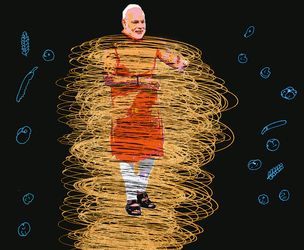Narendra Modi greeted the nation on the morning of Guru Purab, and admitted to his pyare deshvasiyon that there might have been some flaw in his penance. The flaw in the penance is now paving the way for penitence in Parliament. He is taking back the three farm laws.
Not to worry, prime minister! To err is human, to forgive is divine; to regret is political, to forget is democratic. Voters will forgive you and forget this, come Rahul, Mamta, MSP, GST, note ban or petrol price rise.
All the same, what was the flaw in the penance? The PM did not say that, but his speech gives us a clue. He said, “there was debate in Parliament following which these laws were introduced....” There was debate; but not enough.
In our constitutional trimurti scheme, parliament is Brahma (creates laws), the executive is Vishnu (executes laws and maintains order), and the judiciary is Maheswara (chucks out bad laws). But in the dynamics of a vibrant Westminster democracy, we cannot reduce Parliament into such a trinary.
The term ‘parliament’ comes from the French parler which means ‘to talk’; from parler evolved the Anglo-Norman parliament meaning discussion. Thus, more than a law-making body, Parliament is a debating forum.
Ideally, bills are put in the public domain weeks ahead, for public debates—from which law-drafters draw informed opinion. Once a bill is introduced, the wise men of the houses should get time to discuss it, dissect it, debate it or damn it. After one house passes it, it is again discussed, dissected and debated in the other house. They may even send the bill to a committee where members shed their party loyalties, bare their true minds, exercise their brains, summon officials, consult experts, give their objective views, and polish the bill’s rough edges, if any.
Even good laws, as the three farm laws are claimed to be, may carry sharp edges that hurt some people somewhere. Only the people’s representatives—the 780-odd men and women who are sitting, sleeping, speaking or shouting in the houses—can spot those edges and scrape them soft. Not even the “agricultural economists, scientists and progressive farmers” who, as the PM said, tried to explain the laws to the protesters. Experts may think the laws are good, but people ought to be ruled with the laws that they think are good—that is the sacred doctrine of law-making enshrined in the mandate of the Magna Carta. That was also the doctrine that the illustrious Iltutmish, the slave-turned first sultan of Delhi, conveyed to the ulema when he rejected their demand to impose Islamic laws on the Hindus.
In the case of the three bills, the MPs were not given time to even run their fingers through the edges. The debate over the two farm bills lasted just about five hours in the Lok Sabha and three hours in the Rajya Sabha. The bill to amend the essential goods law lasted two hours in the Lok Sabha and half an hour in the Rajya Sabha. Too little, considering the sweep of changes that the laws would bring about in the way we not only sow and reap, but also store and trade grain. The government used its brute majority to reject the opposition’s demands for scrutiny by a committee, and got the bills passed.
Worse still, Parliament has no record of how many of its members supported the bill, and how many opposed it. The demand for a division, the procedure by which the votes are counted in the house, was rejected in the upper house.
In short, the laws were made in haste. As has been discussed in this column often, laws made in haste will be regretted at leisure.
prasannan@theweek.in


